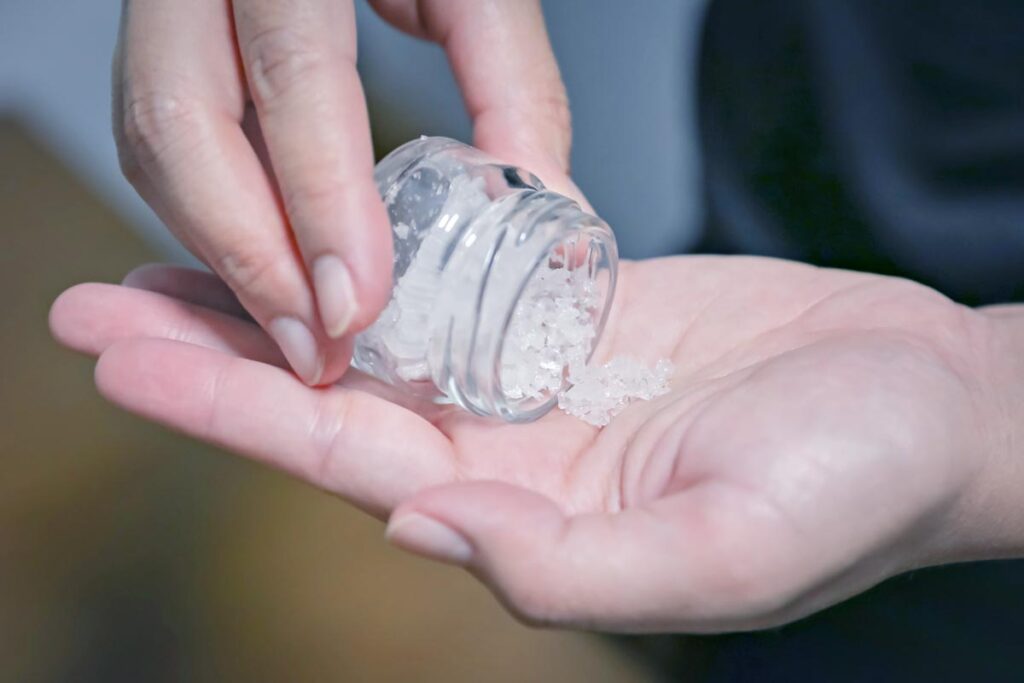
Most of us think of meth use as a rare or extreme thing, but the truth is, more and more Americans use it and regularly. In fact, 0.6% of the population or 1.5 million Americans qualify as having a methamphetamine use disorder, colloquially known as having a meth addiction or being a “meth head”. That’s despite the fact that meth is dangerous, illegal, and often results in severe mental and physical health problems.
If you or a loved one is using or abusing meth, you probably want to help. The first step is probably confirming that they are in fact addicted to methamphetamine. Here, understanding the signs and symptoms of meth addiction will help. However, chances are, if they are using, you already know. It’s difficult to hide the effects of recurring meth use, let alone addiction.
Is Your Loved One Using Meth?
While meth use does not necessitate addiction, it is the first symptom of meth use. Here, if you know your loved one is using meth, it’s a good sign that they have a problem. Methamphetamine is illegal in the United States, it’s high addictive, and any kind of prolonged usage will result in chemical addiction and potentially behavioral addiction.
However, you’ll also see signs and symptoms of meth use. These include:
- Sudden and seemingly random spikes in energy or agitation. People may act as though they are very hyper or wired up, they can’t sleep, and they will stay away hours longer than usual
- Pupils dilated
- Extreme self-confidence or lack of risk awareness
- Shakes or jitters
- Erratic behavior
- Incoherent speech
- Mania
- Sweating, sometimes extreme
- Paranoia
- Irritability or anger
- Bad breath
- Dry mouth
- Inability or no desire to eat / increase in consumption of sugary beverages
- Runny nose or other cold and flu symptoms
After the dose wears off, that person will most likely crash. Here, they may sleep for extremely long times, be fatigued or tired even after a large amount of sleep and may show cold and flu symptoms. That will revert to high energy and mania as soon as they take another dose, often combined with erratic behavior and speech.
Ready to Start A New Life?
Our hands-on approach, compassionate staff, and home-like environment are here for you. Call us today.
Signs and Symptoms of Meth Addiction
A “meth head” is someone who experiences a behavioral addiction to methamphetamine, also known as a substance use disorder. This addiction comprises both a chemical dependency (they experience withdrawal symptoms and cravings when they don’t use) and behavioral dependency (they seek out the drug seemingly without any control of their behavior and seem to spend most of their time and energy on the drug).
Here, you’re significantly likely to notice both mental and physical health problems. Here, physical health problems may resemble an illness. If you’re not usually around that person, you’ll probably notice those signs first. For example, meth users rapidly lose weight once they start using regularly.

- Rapid weight loss – Persons using meth will often lose interest in food and may not eat for several days at a time. When they do have calories, it’s more likely to be sugary soft drinks, which don’t do much for maintaining muscle. So, people using meth can very quickly look like they are wasting away, sometimes losing tens of pounds in a few weeks. If you know they are consuming a large amount of soda and still losing weight, it’s a good sign they are doing too much meth.
- Skin sores – Meth can easily result in skin sores and rashes, which is exacerbated by constant picking at skin and scratching.
- Yellowing or rotting teeth – Meth users very frequently have bad teeth, to the point where it’s known as “meth mouth”. This is caused by poor impulse control, chronic dry mouth, and extreme increases in sugar consumption. Many meth abusers also grind their teeth, causing even further damage. Fast and noticeable degradation of dental health and hygiene are a very major sign of meth abuse.
- Lack of personal hygiene – Meth users will often stop making time to bathe, to wear clothing correctly, or to replace their clothing as they lose weight. This can lead to an unkempt appearance. In addition, skin sores and twitches or lack of brushing hair can make your loved one appear unkempt or deranged.
- Tics and twitches – Meth causes a series of repetitive motions including tics, twitches, shakes, and jitters. Many people also eventually start rhythmic motions like twitching, scratching, and jumping. These motions do not appear until someone is significantly addicted to methamphetamine, because it means the drug is starting to affect their brain.
For most people, the mental side effects of meth abuse are significantly worse than the physical. However, they will be less noticeable if you only sometimes interact with your loved one or primarily interact with them while they are not intoxicated. However, the longer your loved one abuses meth, the more obvious and severe mental side-effects will be.
- Memory problems – Meth users experience significantly impaired visual and verbal memory and may forget what people close to them look like, may forget people walked through a room, and may have trouble following what was said in a conversation even a few moments ago.
- Personality changes – Meth causes increased levels of paranoia, agitation, annoyance, irritability, and anxiety – all of which can considerably change the individual’s personality.
- Psychosis – People experience psychosis, hallucinations, and extreme paranoia for many reasons, but it’s also a very significant indicator of meth abuse. Persons who use meth get consistently more paranoid over time, may see things, may talk to people who aren’t there, and may jump or even be afraid of things that aren’t there.
- Decreasing mental health – Even if your loved one already had issues with anxiety or depression, seeing those symptoms rapidly increase should be a cause for concern.
- Motor skill impairment – Meth abuse often results in noticeable motor skill impairment, meaning that your loved one will lose skill at tasks like opening doors, driving a car, walking, or playing ball.
- Increased temper – Meth causes and increase in agitation, meaning that users show an increase in violent reactions, irritability, and anger.
- Tweaking – Individuals with meth problems may “tweak” where they experience several days of high-intensity twitching, wakefulness, and increasingly erratic behavior and twitching. Their speech, behavior, and mental health may rapidly deteriorate over this period, which can look like they’re having a mental breakdown if you don’t know what’s happening. Eventually, lack of sleep can cause people to behave as though drunk. It’s also important to note that this state can be extremely dangerous, so if your loved one is in it, it’s important to get them into medical care.
Getting Help

If your loved one is abusing meth, they need help. Methamphetamine causes significant and long-lasting damage to mental and physical health. The longer your loved one uses, the worse those problems will get. Getting your loved one into detox and then into drug addiction treatment can and does work. Here, modern addiction treatment involves using behavioral therapy to help people tackle the mental health problems caused by drug abuse, to tackle the underlying problems behind it, and to build new skills and coping mechanisms to live a happy life without drugs.
Recovering from a meth addiction can take years, but the sooner you start, the better off you are.
If you or a loved one would like more information about drug rehab, alcohol rehab, or detox please contact us to speak in complete confidence with one of our experienced treatment advisors today.


